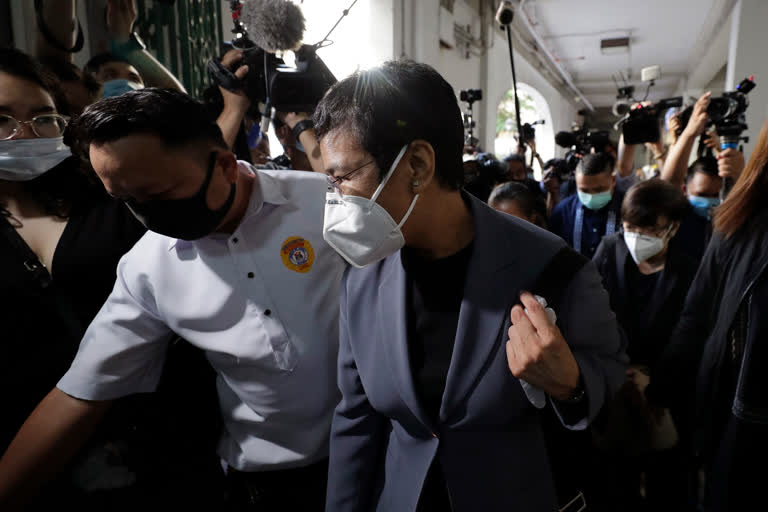Manila: An award-winning journalist critical of the Philippine president was convicted of libel and sentenced to jail on Monday in a decision called a major blow to press freedom in an Asian bastion of democracy.
The Manila court found Maria Ressa of the online news site Rappler Inc. and former reporter Reynaldo Santos Jr guilty of libeling a wealthy businessman.
Rappler editor Maria Ressa speaking to reporters in Manila, on Monday. The Rappler's story on May 29, 2012, cited an intelligence report linking him to a murder, drug dealing, human trafficking and smuggling. The site's lawyers disputed any malice and said the time limit for filing the libel complaint had passed.
"Rappler and both accused did not offer a scintillaof proof that they verified the imputations of various crimes in the disputed article upon Wilfredo Keng," Judge Rainelda Estacio-Montesa said in the 36-page ruling. "They just simply published them as news in their online publication in reckless disregard of whether they are false or not."
Read also:Watch: Philippines doctors use survivor's plasma to tackle new COVID-19 cases
"The decision for me is devastating because it essentially says that Rappler, that we are wrong," Ressa said in a news conference after the ruling. Her voice cracking, she vowed that "we will keep fighting" and appealed to journalists and Filipinos to continue fighting for their rights "and hold power to account."
The businessman, Wilfredo Keng, welcomed the ruling, which he said vindicated him and cleared his name "which Ressa, with one click of a button, attempted to destroy".
Ressa was sentenced to up to six years but her lawyer, Theodore Te, said the jail terms and other penalties imposed could not be enforced unless all appeals were rejected. She posted bail for the case last year and will study possible appeals in the next 15 days, Te said.
Read also:Strong typhoon hits Philippines
"The verdict against Maria Ressa highlights the ability of the Philippines' abusive leader to manipulate the laws to go after critical, well-respected media voices whatever the ultimate cost to the country," said Phil Robertson of Human Rights Watch, adding the verdict was "a frontal assault on freedom of the press that is critical to protect and preserve Philippines democracy."
President Rodrigo Duterte and other Philippine officials have said the criminal complaints against Ressa and Rappler were not a press freedom issue but a part of normal judicial procedures arising from their alleged violations of the law.
Keng dismissed the allegations in the 2012 story as baseless and false and said Rappler refused to take down the story online and publish his side of the story. He provided government certifications in court to show that he has no criminal record and sought 50 million pesos ($1 million) in damages, but the court awarded a much smaller fine.
Rappler's lawyers said the story was based on an unspecified intelligence report and that Philippine penal law requires a libel complaint to be filed within one year. Keng filed his lawsuit in 2017, five years after the story was published.
A cybercrime law, which the Rappler journalists allegedly violated, was also enacted in September 2012 or four months after the story written by Santos was published. Rappler's lawyers said Philippine penal laws cannot be retroactively applied.
AP
